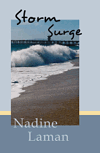Sunday, October 30, 2011
Which is the most important to you?
Assuming the absurd that it isn't the whole package, what is the one ingredient of a book that is the most important piece? Which would you chose: the story, the editing, the layout, the quality of the final product, the cover art, or something else?
Labels:
fiction
Tuesday, October 25, 2011
Sensory Dos and Don'ts
One thing that easily gets overlooked in writing is the sensory component. After the storyline is solid, the characters have unique personalities, and all the settings are imaginable for the reader, it is time to go though and make sure that there is sensory input.
We need to feed, not overfeed, the five senses of the reader. Consider it surround sound, but for all the senses. For example, when I write about the beach in Kathryn's Beach, occasionally there is mention of the hard packed wet sand. The dry sand sifts through her fingers, but it isn't just sand, there are shell bits (and assumed other stuff).
This is not the place to wax literary and go over the top with adjectives and adverbs in every sentence. Remember that less is more. Remember that the reader is an intelligent person with stores of experiences to tap. Avoid switching into the telling mode. Hint at things with simple additions, rather than lengthy descriptions. Allow the reader to tap their knowledge from a key descriptive word.
Keep the momentum of the story moving forward, rather than diverting to sidelines to describe things in detail. Not always, of course, but once in a while note a significant change in smell when changing venue. If something is different from what one would expect, for example a quiet bar, then briefly mention it. Or a fishing boat mysteriously floating unattended for days - wouldn't there be the smell of rotting fish from the morning catch on some fateful day? Basically, you don't want to have something obvious missing from the scene.
Visualize your story and once in a while add a small prop to the set. Read your ms aloud to a friend and both of you look for places where sensor items are missing. Avoid overloading the senses and it getting in the way of the storytelling.
Let me know if you try this and how it worked for you.
We need to feed, not overfeed, the five senses of the reader. Consider it surround sound, but for all the senses. For example, when I write about the beach in Kathryn's Beach, occasionally there is mention of the hard packed wet sand. The dry sand sifts through her fingers, but it isn't just sand, there are shell bits (and assumed other stuff).
This is not the place to wax literary and go over the top with adjectives and adverbs in every sentence. Remember that less is more. Remember that the reader is an intelligent person with stores of experiences to tap. Avoid switching into the telling mode. Hint at things with simple additions, rather than lengthy descriptions. Allow the reader to tap their knowledge from a key descriptive word.
Keep the momentum of the story moving forward, rather than diverting to sidelines to describe things in detail. Not always, of course, but once in a while note a significant change in smell when changing venue. If something is different from what one would expect, for example a quiet bar, then briefly mention it. Or a fishing boat mysteriously floating unattended for days - wouldn't there be the smell of rotting fish from the morning catch on some fateful day? Basically, you don't want to have something obvious missing from the scene.
Visualize your story and once in a while add a small prop to the set. Read your ms aloud to a friend and both of you look for places where sensor items are missing. Avoid overloading the senses and it getting in the way of the storytelling.
Let me know if you try this and how it worked for you.
Labels:
Fiction writing
Sunday, October 9, 2011
Getting Noticed
There are so many people writing these days and so few major publishers. Most large publishers use literary agents as a means of screening manuscripts; getting rid of the awful ones up front. Publishers who don't charge a fee to publish works, screen heavily to find the best bets before backing the project with company funds.
Writers use blogs, twitter, and facebook to get noticed. Writing samples are posted their websites and writing forums. Here is a new one: http://thenextweb.com/media/2011/10/03/pubslush-launches-a-kickstarter-platform-for-book-publishing. If you read the article, you know as much as I know about it. I'm not endorsing it one way or the other; just tossing out this bit of information for you to check out.
I've seen bulk queries come through that obviously are a shotgun attempt born out of desperation to get past the first hurtle and have their full ms requested. To date, every query letter I've received that began, "Dear Sir" hasn't made it past me to the vetting committee.
One committee person asked to read my rejects before I wrote the rejection email, then sent a note that they agreed that the work was so substandard that it wasn't worth taking it to the full committee.
It is extremely important to put your best effort forward every time. You only get one shot at a first impressions and the competition is stiff.
Try not to query when you're tired, feeling low from a rejection letter, or hurried. It will make a difference if you're rested and feeling confident about your work.
If you've self published, you know that your book gets turned away from some sites and some reviewers. It isn't a level playing field. Take a look at this place: http://filedby.com/author/nadine_laman/2238025.
No matter what, write your best work and believe in yourself and your ms.
Writers use blogs, twitter, and facebook to get noticed. Writing samples are posted their websites and writing forums. Here is a new one: http://thenextweb.com/media/2011/10/03/pubslush-launches-a-kickstarter-platform-for-book-publishing. If you read the article, you know as much as I know about it. I'm not endorsing it one way or the other; just tossing out this bit of information for you to check out.
I've seen bulk queries come through that obviously are a shotgun attempt born out of desperation to get past the first hurtle and have their full ms requested. To date, every query letter I've received that began, "Dear Sir" hasn't made it past me to the vetting committee.
One committee person asked to read my rejects before I wrote the rejection email, then sent a note that they agreed that the work was so substandard that it wasn't worth taking it to the full committee.
It is extremely important to put your best effort forward every time. You only get one shot at a first impressions and the competition is stiff.
Try not to query when you're tired, feeling low from a rejection letter, or hurried. It will make a difference if you're rested and feeling confident about your work.
If you've self published, you know that your book gets turned away from some sites and some reviewers. It isn't a level playing field. Take a look at this place: http://filedby.com/author/nadine_laman/2238025.
No matter what, write your best work and believe in yourself and your ms.
Labels:
query success
Sunday, October 2, 2011
What is a fair price for eBooks?
Nearly weekly, but likely more often, the trade news (publishing industry) has an article on the price of ebooks.
Usually the blog or article is stating that ebooks cost nothing after they are posted and should, therefore, be priced extremely low. (Keep in mind the distributor needs to make money to keep their company running so the ebook is available in the first place.)
Obviously those people haven't written a book and don't think an author should make any money on it for the life of the work. That is about like saying a museum should only charge a person once in their life to view an exhibit. How many people donate to their favorite museum to pay to keep the lights on and the doors open?
The reality is that any book, ebook or paper, has to support the author and the business that published it and it won't do it in one sale. It is a bit-by-bit process and a huge gamble that X number of copies will sell to pay for the expense to publish it.
Even with ebooks, a company has to continually keep the lights on and pay people to manage the records...at the bare minimum. (And if you are a writer, you want the company to be able to afford the resources to publish your book with its funds.)
If that company needs to upgrade or replace broken equipment and pay ever increasing taxes, how would that work out with only charging the actual expense of an ebook(remember that ebooks have to pay the distributor too).
I love what I do, but I do want to point out that products, including books, have to support the "manufacturer." Each book is like creating a new car - it requires company resources.
That is my take on why books cost money. And remember the publisher and the author get nothing from books lent to friends and family, or sold at garage sales. The business model, especially in this world economy, has to not be a charity (business is in business to make money).
History judges a society more by its arts than its wars. As people, we tend to expect arts to be gifts, yet understand that war costs money. Consider this, between Sparta and Athens, which still exists?
Until now, I've kept my opinion to myself. I think it is not likely that anyone would go to their job every day and get no paycheck. Something for nothing doesn't sustain the economy. What's your opinion on this?
Usually the blog or article is stating that ebooks cost nothing after they are posted and should, therefore, be priced extremely low. (Keep in mind the distributor needs to make money to keep their company running so the ebook is available in the first place.)
Obviously those people haven't written a book and don't think an author should make any money on it for the life of the work. That is about like saying a museum should only charge a person once in their life to view an exhibit. How many people donate to their favorite museum to pay to keep the lights on and the doors open?
The reality is that any book, ebook or paper, has to support the author and the business that published it and it won't do it in one sale. It is a bit-by-bit process and a huge gamble that X number of copies will sell to pay for the expense to publish it.
Even with ebooks, a company has to continually keep the lights on and pay people to manage the records...at the bare minimum. (And if you are a writer, you want the company to be able to afford the resources to publish your book with its funds.)
If that company needs to upgrade or replace broken equipment and pay ever increasing taxes, how would that work out with only charging the actual expense of an ebook(remember that ebooks have to pay the distributor too).
I love what I do, but I do want to point out that products, including books, have to support the "manufacturer." Each book is like creating a new car - it requires company resources.
That is my take on why books cost money. And remember the publisher and the author get nothing from books lent to friends and family, or sold at garage sales. The business model, especially in this world economy, has to not be a charity (business is in business to make money).
History judges a society more by its arts than its wars. As people, we tend to expect arts to be gifts, yet understand that war costs money. Consider this, between Sparta and Athens, which still exists?
Until now, I've kept my opinion to myself. I think it is not likely that anyone would go to their job every day and get no paycheck. Something for nothing doesn't sustain the economy. What's your opinion on this?
Labels:
Publishing Industry
Subscribe to:
Comments (Atom)

 When Paul Fenton stops for breakfast in a small town, he gets more than he bargained for in the process.
When Paul Fenton stops for breakfast in a small town, he gets more than he bargained for in the process.
 When two-hundred-year-old human remains are discovered on one of Neptune's moons, Earth's history falls into question.
When two-hundred-year-old human remains are discovered on one of Neptune's moons, Earth's history falls into question.
 Emily's husband persuades her to try thalidomide to ease her symptoms as she is unaware of the devastating effects.
Emily's husband persuades her to try thalidomide to ease her symptoms as she is unaware of the devastating effects.
 Who is the women's shelter bomber? Melissa Ryan suspects that her husband knows.
Who is the women's shelter bomber? Melissa Ryan suspects that her husband knows.
 Further developments with the Wilder family.
Further developments with the Wilder family.
 A hidden past shakes the O'Donovan family to its core
A hidden past shakes the O'Donovan family to its core
 A swirl of emotion and choice, set in Cape Town, South Africa
A swirl of emotion and choice, set in Cape Town, South Africa
 Love is a constant, but it comes at a price.
Love is a constant, but it comes at a price.
 When the road ahead is unclear, sometimes you have to rely on trust.
When the road ahead is unclear, sometimes you have to rely on trust.
 The struggle between good and evil is ages old. It gets all the more complicated when the good guys aren't all good and the bad guys have redeeming qualities.
The struggle between good and evil is ages old. It gets all the more complicated when the good guys aren't all good and the bad guys have redeeming qualities.
 Story of a land mothering two races of people – the light-skinned and the dark-skinned.
Story of a land mothering two races of people – the light-skinned and the dark-skinned.
 A gifted Ukrainian ballerina comes into possession of a mysteriously coded address book.
A gifted Ukrainian ballerina comes into possession of a mysteriously coded address book.
 Six passengers' lives change for better or worse after they arrive in Honiton.
Six passengers' lives change for better or worse after they arrive in Honiton.
 Resilience and love in a harsh and unforgiving age
Resilience and love in a harsh and unforgiving age
 Kathryn's Beach
Kathryn's Beach High Tide
High Tide Storm Surge
Storm Surge